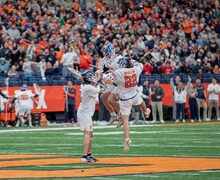Syracuse University hosts 40th annual MLK Celebration dinner
Avery Magee | Asst. Photo Editor
Keynote speaker Sarah Willie-LeBreton, president of Smith College, grew up in Syracuse and spoke about the job of higher education in regards to Rev. Dr. Martin Luther King Jr.'s work. Her father was friends with King and convinced him to speak at SU.
Get the latest Syracuse news delivered right to your inbox.
Subscribe to our newsletter here.
Sherry Bryant was 10 years old when she watched from the crowd as Rev. Dr. Martin Luther King Jr. famously delivered his “I Have a Dream” speech in 1963. In front of the young Bryant and over 260,000 people, King called for a more equitable society, speaking against segregation and discrimination.
Over 50 years after King’s assassination in 1968, Bryant continues to honor his legacy.
Bryant was part of a sold-out crowd gathered in the JMA Wireless Dome Sunday night to honor King’s life and recognize Syracuse University’s Unsung Hero Award winners, created in 1994 to honor King’s vision of creating positive change. The gathering looks to honor SU community members who embody the work, life and legacy of King.
“I was 10 years old when Martin Luther King marched, and I was in that crowd. And now, when I see everything that he dreamed, when he said, ‘I have a dream,’ I see it all coming into fruition,” Bryant said.
The event’s keynote speaker was Sarah Willie-LeBreton, president of Smith College, who grew up in Syracuse after her father Charles Willie, an SU alum, became a professor in 1957.
Willie was close friends with King and convinced him to speak at SU in 1961 and 1965, Willie-LeBreton said. Two years after King spoke at the university, Willie became the first Black full-time professor and department chair at SU in 1967. He then served as the SU’s first Black vice president in 1972. Willie-LeBreton’s mother was also an SU alumna and served as president of the university’s Women’s Club.
“One of the main points of extra significance is bringing Sarah Willie-LeBreton back, because not only is she a leader nationally, but her father was our first African American professor, tenured professor,” SU Chancellor Kent Syverud told The Daily Orange.
During her remarks, Willie-LeBreton spoke about her childhood in Syracuse before entering a career in higher education, where she has focused on fostering diversity, equity and inclusion.

Avery Magee | Asst. Photo Editor
A sold-out crowd gathered in the JMA Wireless Dome Sunday night to honor Dr. Martin Luther King Jr.’s life and recognize SU’s Unsung Hero award winners. The award was created in 1994 to honor Dr. King’s vision of creating positive change.
Willie-LeBreton said that before King’s work and the passage of legislation promoting educational equality, very few Black students graduated high school or college. She said 50 years ago, only 4% of Black adults had a bachelor’s degree, but that number has jumped to 25% today.
“We are here tonight because we must be here,” Willie-LeBreton said. “The work of higher education is intertwined with the work in which King was engaged. In the United States, the work of the university campus has always been in generative tension with the work of democracy.”
SU’s Unsung Hero awards aim to recognize community members, students, faculty and staff who have made a positive impact on the lives of others. Each year, recipients are chosen by the celebration’s planning committee.
Marissa Willingham, program manager for the Barner-McDuffie House and a member of the celebration committee, said selecting the recipient for each award is extremely difficult.
“We get a lot of nominations of people who truly deserve to be recognized, but with a limited amount that we can show every year, it’s hard,” Willingham said. “They do completely other things outside their job scope. Reading those nominations, you’re like, ‘Wow, I want to highlight this person. I want to highlight that person.’”

Avery Magee | Asst. Photo Editor
The Unsung Hero Awards aim to highlight those who embody the work, legacy and life of King. The recipients were recognized during the 40th Celebration.
The awards are separated into four categories: a youth, a community member, a SU or SUNY ESF student and an SU or SUNY ESF faculty or staff member.
Award winners included student awardee Andrea Rose-Oates, faculty awardee James Duah-Agyeman, and community member awardee Laurence Segal. The Student Coalition on Race and Equity won in the youth category.
This year, a fifth posthumous category was added to honor Jamie Jackson, who worked in SU’s Parking and Transportation Services for over 20 years. Jackson died in Sept. 2024.
Among the award winners, there was a common theme of giving back to the community. Since the event’s first year with the awards in 1994, Willingham said past winners have put others first, similar to King.
“You can’t just be in your own world. You want to see people give back. And so being an unsung hero, you’re giving back, not only to yourself, but your community,” Willingham said.
Published on January 27, 2025 at 12:24 am
Contact Henry: hdaley@syr.edu





